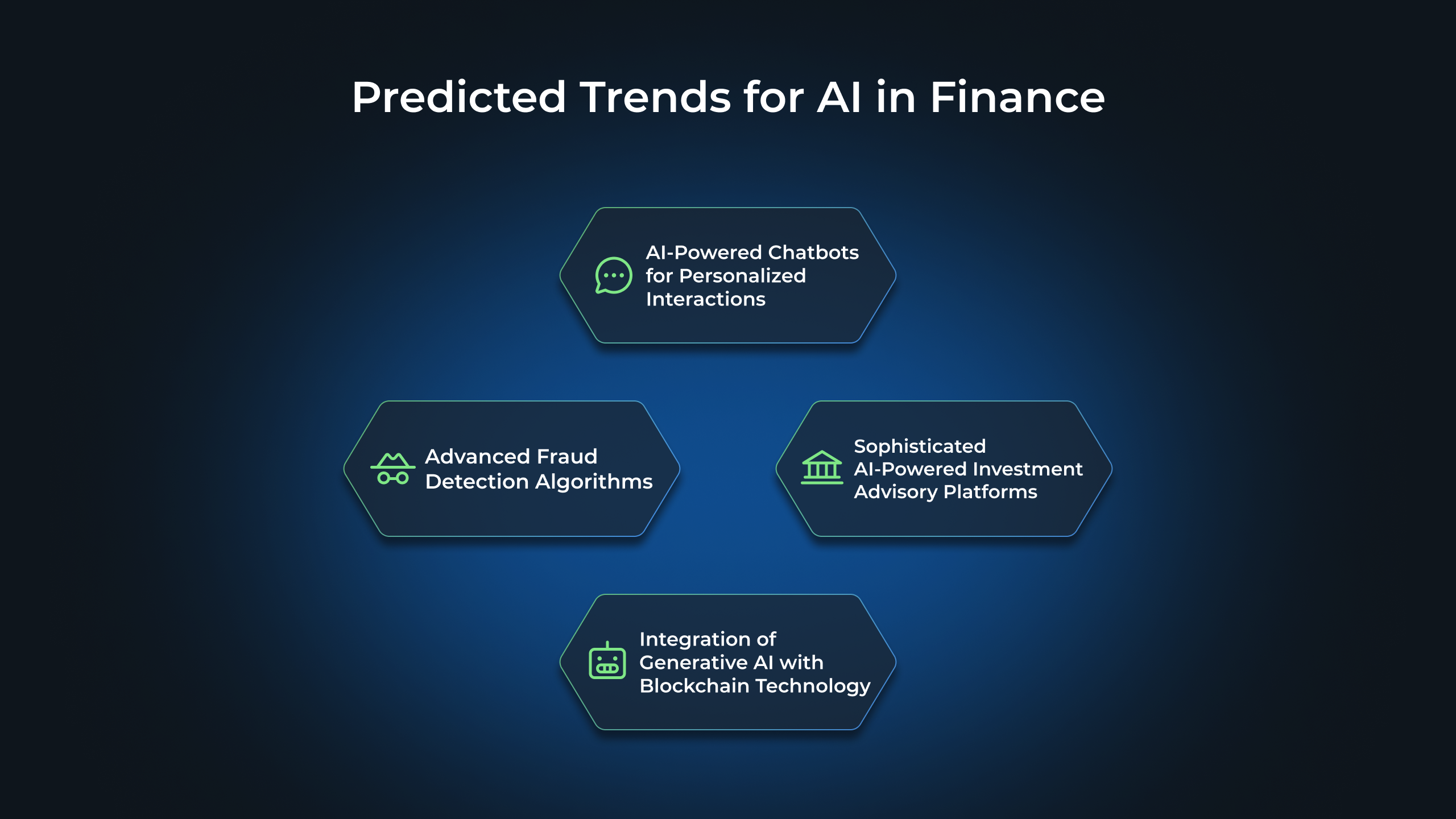In today’s rapidly evolving world, technology has become an integral part of the banking and finance industry. One of the most groundbreaking advancements in this space is the use of Generative AI. This cutting-edge technology has the potential to revolutionize the way financial institutions operate, making processes more efficient, improving decision-making, and enhancing overall customer experiences.
What is Generative AI?
Generative AI, a subset of artificial intelligence, stands out for its ability to create innovative content rather than replicate existing data. Powered by deep learning and neural networks, Generative AI analyzes extensive datasets to identify patterns, offering a foundation for producing realistic and high-quality content.
In the financial sector, Generative AI’s prowess shines as it crafts personalized investment portfolios based on individual risk profiles and market trends. This application enhances client satisfaction and outcomes, showcasing the technology’s potential to revolutionize financial services. Beyond finance, Generative AI finds applications in healthcare, software development, art, and design, leaving an indelible mark on diverse industries. With its capacity to generate original content, Generative AI promises a future marked by creativity and tailored solutions across various sectors.
The integration of AI technologies into the finance industry has ushered in a transformative era. Financial institutions leverage AI to automate processes, offer intelligent recommendations, and bolster risk management. This revolution in banking is evident in the enhanced customer experiences, streamlined operations, and improved fraud detection facilitated by AI. Chatbots, fueled by AI, provide instantaneous customer assistance, reducing operational costs while increasing satisfaction.
The impact of AI extends to data analysis, empowering banks to glean insights and make informed decisions, from predicting customer preferences to proactively managing risks. Investment advisory, insurance underwriting, and credit scoring benefit from AI-powered solutions, facilitating accurate predictions, personalized recommendations, and fairer pricing. Robo-advisors, an outcome of AI in investment advisory, democratize financial advice and cut costs for investors. Insurance underwriting and credit scoring have experienced efficiency gains through the incorporation of AI algorithms, ensuring faster processes and more comprehensive risk assessments. In conclusion, the synergy of AI and finance continues to reshape the industry, promising further advancements and innovations in the future.
Generative AI in Banking
Generative AI holds enormous promise for the banking industry, particularly in automating manual processes and improving risk management strategies.
The use of Generative AI in the banking sector has revolutionized the way banks operate. By harnessing the power of artificial intelligence, banks are able to streamline their processes and enhance their risk management capabilities.
Automating Banking Processes with AI
With the help of Generative AI, banks can automate a wide range of processes, such as customer document verification, loan underwriting, and fraud detection. By training AI models on historical data, banks can teach algorithms to recognize patterns and make accurate decisions with minimal human intervention.
Automating these processes not only saves time and resources but also improves accuracy and reduces the potential for human error. By leveraging AI technology, banks can ensure that routine tasks are completed efficiently and effectively.
Furthermore, the automation of these processes allows bank employees to focus their efforts on more strategic and value-added activities. This not only enhances overall productivity and efficiency but also enables employees to provide better customer service and support.
Risk Management and AI
Risk management is a critical aspect of banking operations. Generative AI can assist banks in identifying potential risks and developing strategies to mitigate them.
By analyzing vast amounts of financial data and market indicators, AI algorithms can detect anomalies, anticipate market trends, and make informed risk-management decisions. This level of predictive analytics empowers banks to proactively manage risks and reduce their exposure to potential threats.
Moreover, Generative AI can help banks in monitoring and detecting fraudulent activities. By continuously analyzing customer transactions and patterns, AI algorithms can identify suspicious behavior and flag potential fraud cases. This not only protects banks from financial losses but also safeguards the interests of their customers.
In addition to risk management, Generative AI can also assist banks in optimizing their investment strategies. By analyzing market trends and historical data, AI algorithms can provide valuable insights and recommendations for investment decisions. This enables banks to make more informed and profitable investment choices.
In conclusion, Generative AI has the potential to revolutionize the banking industry. By automating manual processes and enhancing risk management capabilities, banks can improve efficiency, accuracy, and customer satisfaction. The integration of AI technology in banking operations is a testament to the continuous advancements in the field of artificial intelligence.
Generative AI in Finance
Generative AI, with its ability to simulate and create new data, has vast applications in banking and significant implications for the broader field of finance. It has the potential to revolutionize various aspects of finance, from investment and portfolio management to financial forecasting.
AI in Investment and Portfolio Management
Investment and portfolio management require deep analysis of various market factors and individual asset performance. Generative AI can assist portfolio managers in making informed investment decisions based on historical trends and market indicators.
With the help of AI algorithms, portfolio managers can develop optimal asset allocation strategies, minimize risk, and maximize returns for their clients. These algorithms can continuously monitor market conditions, adjusting portfolio compositions to capitalize on emerging opportunities or mitigate potential losses.
Moreover, generative AI can analyze vast amounts of financial data, including historical market data, company financial statements, and news sentiment analysis, to identify patterns and correlations that may not be apparent to human analysts. This can provide portfolio managers with valuable insights and help them make more accurate and profitable investment decisions.
AI in Financial Forecasting
Financial forecasting is a critical aspect of finance, enabling organizations to make informed strategic decisions. Generative AI has the potential to enhance the accuracy and reliability of financial forecasts.
By analyzing historical financial data, market trends, and economic indicators, AI algorithms can generate predictions and forecasts with greater precision. This empowers financial professionals to better anticipate market fluctuations, devise effective risk management strategies, and make timely investment decisions.
Generative AI can also take into account external factors such as geopolitical events, regulatory changes, and macroeconomic trends, which can significantly impact financial markets. By incorporating these factors into the forecasting models, generative AI can provide more comprehensive and accurate predictions, helping organizations navigate uncertainties and make informed decisions.
Furthermore, generative AI can assist in scenario analysis and stress testing. By simulating various hypothetical scenarios and their potential impact on financial markets, AI algorithms can help financial professionals assess the resilience of their portfolios and develop contingency plans.
In conclusion, generative AI holds immense potential in the field of finance. It can empower portfolio managers with advanced analytical capabilities, enhance the accuracy of financial forecasts, and enable organizations to make more informed and profitable decisions. As the technology continues to advance, we can expect generative AI to play an increasingly significant role in shaping the future of finance.
The Future of AI in Banking and Finance
The future of AI in banking and finance is filled with promise and exciting possibilities. As the technology continues to evolve, we can expect several noteworthy trends and potential challenges.
Artificial Intelligence (AI) has already made significant strides in the banking and finance industry, revolutionizing various aspects of operations. From automating processes to improving risk management and enhancing customer experiences, the applications of AI are vast and promising.
Predicted Trends for AI in Finance

From our experience in software development, we anticipate several emerging trends in the AI space. These trends will shape the future of finance and transform the way financial institutions operate:
-
AI-Powered Chatbots for Personalized Interactions:
- Anticipate an increased adoption of AI-powered chatbots in finance, leveraging natural language processing and machine learning algorithms to offer customers personalized recommendations, answer queries, and facilitate transactions, enhancing the overall customer experience.
-
Advanced Fraud Detection Algorithms:
- As cyber threats evolve, expect the development of advanced AI-driven fraud detection algorithms. These systems will analyze real-time data, identifying patterns and anomalies to detect and prevent fraudulent activities, safeguarding both customers and financial institutions.
-
Sophisticated AI-Powered Investment Advisory Platforms:
- Envision the emergence of more sophisticated AI-powered investment advisory platforms. These platforms will utilize machine learning algorithms to analyze market trends, assess risk, and provide personalized investment recommendations. Investors will benefit from more accurate predictions and tailored investment strategies, ultimately improving returns.
-
Integration of Generative AI with Blockchain Technology:
- Foresee the integration of Generative AI with blockchain technology in finance, revolutionizing identity verification and transaction validation. This integration promises enhanced security and transparency in financial transactions, mitigating the risk of fraud and unauthorized access, and ensuring the integrity of financial processes.
Challenges and Solutions for AI in Banking
While the potential of AI in banking and finance is immense, it’s essential to address the challenges that may arise. By proactively addressing these challenges, financial institutions can fully harness the power of AI while mitigating potential risks.
-
Data Privacy and Security:
- Challenge: Protecting vast amounts of sensitive customer data is a paramount concern.
- Solution: Financial institutions must prioritize data protection by implementing encryption, access controls, and regular security audits to safeguard customer data from unauthorized access and cyber threats.
-
Biases in AI Algorithms:
- Challenge: AI systems learning from biased historical data may perpetuate biases in decision-making processes.
- Solution: Financial institutions should continuously monitor and audit AI algorithms to detect and mitigate biases. Implementing diverse and inclusive training datasets helps reduce biases, ensuring fair and equitable outcomes.
-
Impact on Employment:
- Challenge: The potential displacement of jobs due to AI automation is a concern.
- Solution: Financial institutions can mitigate this by investing in reskilling and upskilling programs for employees. Providing training in areas where human expertise remains crucial ensures a smooth transition to an AI-powered future while retaining valuable talent.
Conclusion
In conclusion, Generative AI has the potential to transform the banking and finance industry in significant ways. The predicted trends, such as AI-powered chatbots, advanced fraud detection algorithms, and sophisticated investment advisory platforms, will revolutionize the way financial institutions operate. However, it is crucial to address potential challenges, such as data privacy and security, biases in AI algorithms, and the impact on employment, to fully harness the power of AI in banking and finance.
Are you interested in exploring how Generative AI can benefit your financial institution? Contact us today for a free consultation or project estimation. Our team of experts at WeSoftYou will be delighted to assist you in harnessing the power of Generative AI for your banking and finance needs.
FAQ
Generative AI, or Generative Artificial Intelligence, is a subset of artificial intelligence (AI) that focuses on the creation of new and original content rather than simply replicating existing data. It involves training algorithms to generate diverse types of information, such as images, text, or even videos, based on patterns and insights derived from extensive datasets. Leveraging the power of deep learning and neural networks, Generative AI algorithms have the capability to produce content that is realistic and of high quality, often indistinguishable from that created by humans. This technology has found applications across various industries, showcasing its potential to revolutionize fields such as healthcare, finance, entertainment, and beyond.
Generative AI transforms personalized customer interactions by leveraging natural language processing and machine learning algorithms in chatbots. These chatbots offer tailored recommendations, answer queries, and facilitate transactions, elevating the overall customer experience in banking and finance.
Generative AI plays a crucial role in advanced fraud detection algorithms. By analyzing vast amounts of real-time data, these algorithms identify patterns and anomalies to detect and prevent fraudulent activities, ensuring the security of both customers and financial institutions.
Generative AI is anticipated to integrate with blockchain technology to revolutionize identity verification and transaction validation in banking. This integration ensures enhanced security and transparency, mitigating the risk of fraud and unauthorized access, and preserving the integrity of financial processes.





















